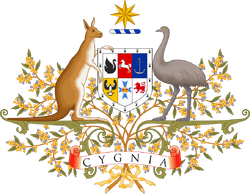| City and State of Singapore Bandar dan Negeri Singapura (Melayu) 新加坡城市和狀態 (Chinese) | |||||
|---|---|---|---|---|---|
Skyline of Singapore | |||||
| Nickname(s): The Merlion State | |||||
| Motto(s): Majulah Singapura (Melayu) Onward Singapore | |||||
| State anthem: "Majulah Singapura" | |||||
| Official language(s) | English, Chinese, Melayu | ||||
| Spoken languages | English, Chinese, Melayu, French, Dutch | ||||
| Demonym | Singaporean | ||||
| Capital
(and largest city) |
Singapore | ||||
| Area | Ranked 18th | ||||
| – Total | 719.1 km2 | ||||
| Population | Ranked 14th | ||||
| – Total | 5.399 million | ||||
| – Density | 7,987.52 | ||||
| Admission to Federation | 15 August 1963 (11th) | ||||
| Legislature | Parliament | ||||
| Senators | Ellen Lee (NUP) Lui Tuck Yew (NUP) Raymond Lim (NUP) Christopher Souza (NUP) | ||||
| House delegation | List | ||||
| Time zone | Western Standard Time (UTC +8) | ||||
Singapore, officially the City and State of Singapore (Melayu: Bandar dan Negeri Singapura; Chinese: 新加坡城市和狀態, Hanyu pinyin: Xīnjiāpō chéngshì hé zhuàngtài) is one of the states of Cygnia, and is the northernmost of these states. The Malayan republic of Peninsular Malaya lies to the north, and the closest Cygnian state to it is Samudra to the southwest. Singapore is the smallest by land area and 14th most populous of the 18 Cygnian states. It is the only one of the Cygnian states to have a Chinese majority.
In 1819, Sir Stamford Raffles founded colonial Singapore as a trading post of the East India Company; the islands were ceded to Cygnia and became part of the Straits Settlements in 1826. During World War III and Cygnian Revolution, Singapore became a major base for the armies that ultimately liberated Australien-occupied Cygnia from the Rijk. During the decolonisation era, the Straits Settlements chose to join the Malayan Union, but Singapore held a referendum in 1963, voting to be annexed into Cygnia as a state. Despite lacking natural resources and a hinterland, the new state developed rapidly as an Asian Tiger economy, based on interstate and external trade, as well as its human capital. Singapore quickly became one of the most developed states in the Empire.
Singapore is both a national and global commerce, finance and transport hub. Its standings include: the most "technology-ready" state, top International-meetings city, city with "best development potential", most competitive state, 3rd-largest oil refining and trading centre and one of the top two busiest container ports since the 1990s. One of Singapore's best known global brands is Changi Airport, which is among the most-awarded in its industry.
Singapore ranks highly on its state social policies; were it an independent nation, it would lead Asia and sit at 11th place on the Human Development Index, notably on key measures of education, healthcare, life expectancy, quality of life, personal safety, and housing. Although income inequality is comparatively high to the rest of Cygnia, 90% of resident households own their homes, and there are low state taxes. Singapore is home to 5.4 million residents, 38% of whom are permanent residents and other foreign nationals. Singaporeans are mostly bilingual in a mother-tongue language and English as their common language. Its cultural diversity is reflected in its extensive ethnic "hawker" cuisine and major festivals – Chinese, Malay, Indian, Western – which are all state holidays.
| |||||||||||||||||||||||
| ||||||||||||||





